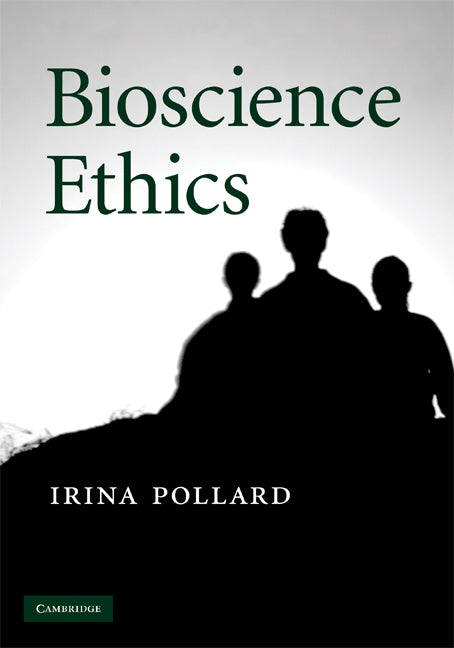Freshly Printed - allow 8 days lead
Couldn't load pickup availability
Bioscience Ethics
Discusses the new ways of communicating bioscience ethics, a new but internationally recognised term coined by the author in 1994.
Irina Pollard (Author)
9780521745277, Cambridge University Press
Paperback, published 28 May 2009
332 pages, 15 b/w illus.
24.8 x 17.3 x 1.5 cm, 0.68 kg
'… informative, accomplished, and illustrated where appropriate. Irina Pollard has created a highly factual and incredibly diverse book which should be of interest to a very broad readership.' The Biologist
Bioscience ethics facilitates free and accurate information transfer from applied science to applied bioethics. Its major elements are: increased understanding of biological systems, responsible use of technology, and attuning ethnocentric debates to new scientific insights. Pioneered by Irina Pollard in 1994, bioscience ethics has become an internationally recognized discipline, interfacing science and bioethics within professional perspectives such as medical, legal, bio-engineering, and economics. Written for students and professionals alike, the fundamental feature of this book is its breadth, important because bioscience ethics interweaves many diverse subjects in the process of gathering specialist scientific knowledge for bioethical review. It contains chapters which embrace topics affecting human reproduction, end-of-life care and euthanasia, challenge human-dominated ecosystems, and review population growth, economic activity and warfare. A background section describes the evolution of ethical consciousness, explores the future, and proposes that the reworking of ethical boundaries can enhance mature decision-making in harmony with changing technology.
1. Human origins, natural selection and the evolution of ethics
2. Sex determination, brain sex and sexual behaviour
3. Inappropriate lifestyle and congenital disability in children: basic principles of growth, toxicology, teratogenesis and mutagenesis
4. Substance abuse and parenthood: biological mechanisms - bioethical responsibilities
5. Fertility awareness: the ovulatory method of birth control, aging gametes and congenital malformation in children
6. Understanding child abuse and its biological consequences
7. The state of wellbeing: basic principles, coping strategies and individual mastery
8. The state of wellbeing: on the end of life care and euthanasia
9. Current reproductive technologies: achievements and desired goals
10. The recombinant DNA technologies
11. Stem cells, nuclear transfer and cloning technology
12. Human dominated ecosystems: re-evaluating environmental priorities
13. Human dominated ecosystems: reclaiming the future for following generations
14. Human dominated ecosystems: warfare = fitness enhancement or losing strategy?
15. Human dominated ecosystems: reworking bioethical frontiers.
Subject Areas: Life sciences: general issues [PSA], Medicine: general issues [MB], Philosophy [HP]


